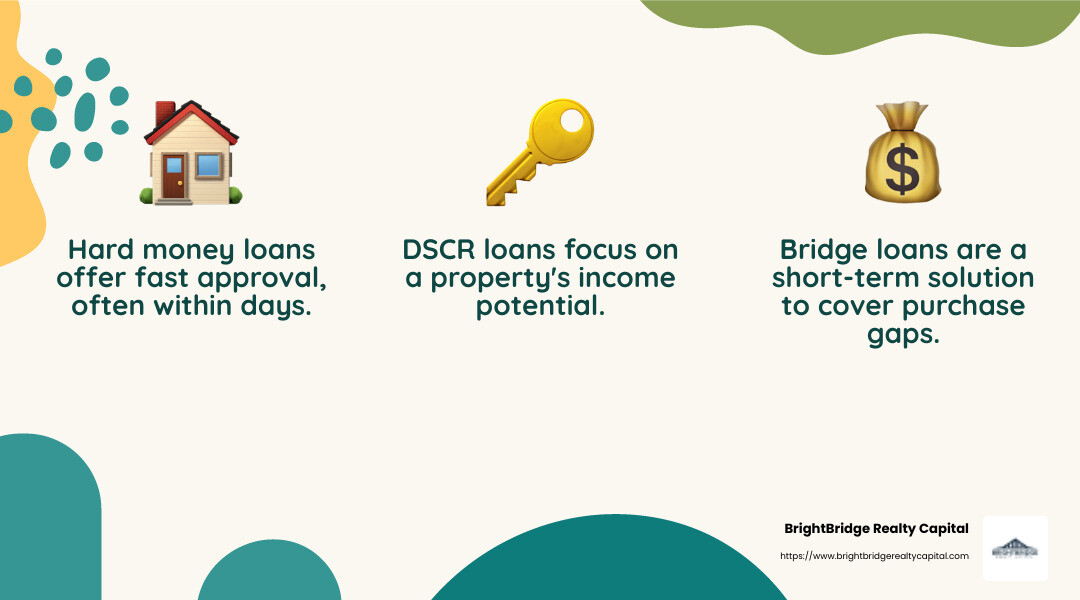Short Term Property Finance: Your Guide to Smart Investments

Short term property finance is a game-changer for real estate investors looking to seize quick opportunities without the red tape of traditional loans. By leveraging short term loans, like hard money or bridge loans, investors can access flexible and fast financing custom to fix-and-flip projects or expanding rental portfolios. This type of finance is perfect for those frustrated with lengthy loan processes and exorbitant rates, providing a reliable avenue to capitalize swiftly on lucrative investments.
Here's how short term property finance serves your needs:
- Quick and flexible financing: Perfect for rapid investment strategies.
- Custom for non-traditional assets: Fit for fix-and-flip or rental expansions.
- Competitive rates and fast closings: Ideal for real estate investors seeking efficient solutions nationwide.
Whether you're dealing with a sudden property opportunity or need to expedite a renovation project, short term property finance stands out as the smart choice for agile investors. Let’s explore how these finance options can take your real estate game to the next level.

Key terms for short term property finance:
- financing for short term rental properties
- hard money loan for investment property
- easy investment property loans
Understanding Short Term Property Finance
Short term property finance is a vital tool for real estate investors who need to move quickly and efficiently. This type of financing allows for the acquisition and improvement of properties without the lengthy approval processes associated with conventional loans.
Financing Options
There are several short-term financing options available, each designed to meet different investment needs:
Bridge Loans: These are temporary loans designed to bridge the gap between buying a new property and selling an existing one. They are ideal for investors who want to secure a property quickly while waiting for longer-term financing.
Short-Term Loans: These are loans with shorter repayment periods, often less than five years. They are typically used for quick projects, such as renovations or flipping a property. The goal is to pay off the loan quickly, ideally with the proceeds from selling the upgraded property.
Benefits of Short Term Property Finance
Speed: Investors can secure funding quickly, often within days. This speed is crucial when competing for properties in a hot market.
Flexibility: These loans often have more flexible terms than traditional mortgages. Investors can negotiate terms that align with their specific project timelines and financial goals.
Asset-Based Lending: Many short-term loans, like DSCR loans, focus on the property's income potential rather than the borrower's personal income. This makes it easier for investors with multiple properties to qualify.
Risks to Consider
Short term property finance is not without risks. These loans often come with higher interest rates due to their short duration and the perceived risk by lenders. Additionally, investors must ensure that their projects can be completed and sold or refinanced within the loan period to avoid financial strain.

In summary, short term property finance offers a flexible and rapid solution for real estate investors eager to capitalize on market opportunities. Understanding the nuances of each financing option can empower investors to make informed decisions and maximize their investment potential.
Types of Short Term Property Finance
When it comes to short term property finance, investors have several options to consider. Each type of financing serves different needs and investment strategies. Let's explore the most common types: hard money loans, bridge loans, and DSCR loans.
Hard Money Loans
Hard money loans are short-term, asset-based loans provided by private lenders. They're popular among real estate investors for their speed and flexibility. These loans are often used for projects like fix-and-flip properties or quick renovations.
Key Features:
- Fast Approval: Hard money loans can be approved in as little as a few days, allowing investors to act quickly on opportunities.
- Flexible Terms: Since they're offered by private lenders, the terms can be custom to the specific needs of the project.
- Higher Interest Rates: Due to their short duration and higher risk, these loans typically come with higher interest rates compared to traditional loans.
Bridge Loans
Bridge loans are designed to fill the gap between the purchase of a new property and the sale of an existing one. They're ideal for investors who need to secure a property quickly but are waiting on longer-term financing.
Advantages:
- Short-Term Solution: These loans are typically for less than a year, making them a temporary solution until permanent financing is secured.
- Quick Funding: Like hard money loans, bridge loans are known for their quick approval process, which is crucial in competitive markets.
- Collateral-Based: The existing property often serves as collateral, reducing the need for extensive income verification.
DSCR Loans
Debt Service Coverage Ratio (DSCR) loans are a type of asset-based financing focused on the property's income potential. They're particularly appealing for investors with multiple properties or those looking to expand their portfolio.
Benefits:
- Income Focused: These loans prioritize the property's ability to generate income over the borrower's personal financial situation.
- Portfolio Expansion: Investors can use the positive cash flow from existing properties to qualify for additional loans, facilitating portfolio growth.
- Flexible Terms: DSCR loans offer flexible repayment terms, including options like fixed-rate, interest-only, or balloon payments.

In conclusion, choosing the right type of short term property finance depends on the investor's specific needs, timeline, and project goals. Whether it's the speed of hard money loans, the bridging capabilities of bridge loans, or the income-based approach of DSCR loans, each option provides unique advantages for savvy real estate investors.
How to Qualify for Short Term Property Finance
Qualifying for short term property finance involves meeting specific requirements that lenders look for. Here's what you need to know:
Credit Score
A strong credit score is crucial. Most lenders require a minimum score of 660, but a score of 680 or higher can get you better rates and terms. A good credit score shows lenders that you are a responsible borrower, reducing their risk.
Down Payment
Expect to make a larger down payment compared to traditional loans. Typically, you’ll need to put down 20-25% of the property's purchase price. This upfront investment shows your commitment and reduces the lender's risk.
Income Verification
Lenders will want to see proof of income to ensure you can handle the loan payments. You'll need to provide pay stubs, tax returns, and bank statements. Additionally, projected rental income from the property can be a significant factor in qualifying for the loan. Tools like AirDNA and Rabbu are often used to estimate potential rental income.
Debt-to-Income Ratio
Your debt-to-income (DTI) ratio is another key factor. Most lenders prefer a DTI ratio below 45%. This ratio helps them assess your ability to manage additional debt. If the property has strong income potential, lenders might be more flexible with the DTI ratio.
Experience
Having experience in managing short-term rentals can be a plus. Lenders may view experienced investors as less risky, especially if you have a history of successful property investments. This experience can sometimes offset other areas where your application might not be as strong.
By focusing on these key areas, you can improve your chances of qualifying for short term property finance. Each lender might have slightly different requirements, so it's important to understand what they are looking for before applying.
Benefits and Risks of Short Term Property Finance
Short term property finance offers a unique opportunity for investors, but weigh the benefits against the risks. Let's explore what makes these investments appealing and what you should watch out for.
Investment Potential
High Returns: One of the biggest draws of short term property finance is the potential for high returns. Properties in popular vacation areas can generate significant rental income, especially during peak seasons. For example, short-term rentals can often earn more in a month than long-term rentals do in several months.
Flexibility: These loans typically offer flexible terms, allowing investors to tailor repayment schedules to fit their cash flow needs. This flexibility can be a game-changer, especially for those managing multiple properties.
Portfolio Diversification: Investing in short-term rentals can diversify your portfolio. Real estate investments often perform differently than stocks or bonds, providing a buffer against market volatility.
Risk Factors
Market Fluctuations: The real estate market can be unpredictable. Changes in the economy or local tourism can affect rental demand and property values. This unpredictability can lead to periods of vacancy, impacting your cash flow.
Higher Interest Rates: Short term loans often come with higher interest rates compared to traditional mortgages. These rates can eat into your profits if not managed carefully.
Regulatory Challenges: Many cities are implementing strict regulations on short-term rentals. It's crucial to stay informed about local laws to avoid fines or legal issues.
Income Generation
Steady Cash Flow: When managed well, short term rentals can provide a steady stream of income. Many investors use the rental income to cover mortgage payments, property taxes, and maintenance costs.
Tax Benefits: Investors can benefit from various tax deductions, such as mortgage interest, property depreciation, and maintenance expenses. These deductions can significantly reduce your taxable income.
Appreciation: Real estate generally appreciates over time. As property values rise, your investment grows, offering potential profits when you decide to sell.
In conclusion, while short term property finance offers attractive opportunities for income and growth, consider the accompanying risks. Being aware of these factors can help you make informed decisions and maximize your investment's potential.
Frequently Asked Questions about Short Term Property Finance
What is the typical loan-to-value ratio for short term property finance?
In short term property finance, the Loan-to-Value (LTV) ratio is a critical factor. Typically, lenders offer an LTV ratio of up to 80% for short term rental loans. This means you can borrow up to 80% of the property's purchase price or appraised value, whichever is lower. The remaining 20% is usually required as a down payment. This LTV ratio is standard because it balances the lender's risk while allowing investors to leverage their capital effectively.
How does the Debt Service Coverage Ratio (DSCR) impact loan eligibility?
The Debt Service Coverage Ratio (DSCR) is a key metric in determining loan eligibility for short term property finance. It measures the property's ability to generate enough income to cover its debt obligations. A DSCR of 1 or higher indicates that the property produces sufficient income to cover the loan payments. This makes it an attractive option for investors, as lenders focus more on the property's income-generating potential rather than the borrower's personal financial history. For short term rental loans, some lenders may not even require a minimum DSCR, especially if the property shows strong income potential.
Can rural properties qualify for short term rental loans?
Yes, rural properties can qualify for short term rental loans, but there are some considerations. Lenders typically assess the income-generating potential of the property, even in rural areas. However, the location can impact loan qualification since rural properties might have different market dynamics compared to urban or tourist-heavy areas. It's essential to demonstrate the property's ability to attract renters and generate income, as this affects the lender's risk assessment. Some lenders may require additional documentation or a higher DSCR to ensure the investment is viable in less populated areas.
In summary, understanding the nuances of short term property finance can help you steer the complexities of securing a loan and making smart investments. Whether it's the LTV ratio, DSCR, or the location of the property, knowing these factors can give you an edge in the competitive real estate market.
Conclusion
BrightBridge Realty Capital is your go-to partner for navigating short term property finance. We pride ourselves on providing fast closings, often within a week. This speed is crucial in the real estate market, where opportunities can vanish quickly. Our direct lending approach means there are no middlemen, allowing us to offer competitive rates that are hard to beat.
Our expertise in real estate financing solutions is custom to meet the unique needs of investors. Whether you're flipping properties, building from scratch, or expanding your rental portfolio, we have the right loan options for you. Our seamless process ensures you get the funding you need without the usual headaches associated with financing.
By choosing BrightBridge Realty Capital, you gain a reliable partner committed to helping you achieve your investment goals. Our nationwide reach ensures you have access to capital no matter where your properties are located.
Ready to take the next step in your investment journey? Explore our loan options and find how we can help you succeed in the competitive real estate market.


